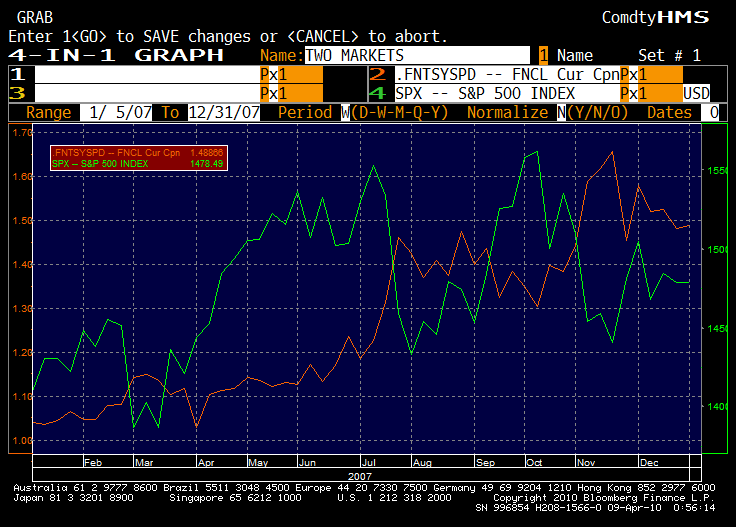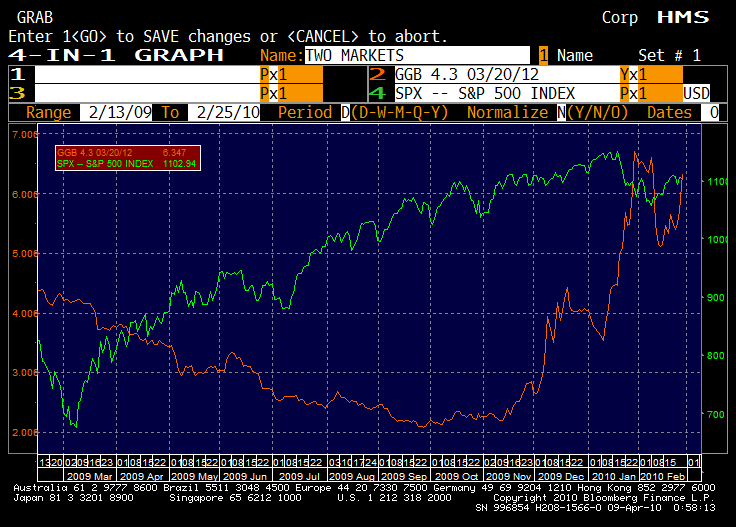By Rom Badilla, CFA at Bondsqauwk:
On March 28, 2007 before the Joint Economic Committee, Federal Reserve President Ben Bernanke stated, “At this juncture, however, the impact on the broader economy and financial markets of the problems in the subprime market seems likely to be contained.”
Later that year on July 26, Paulson told Bloomberg news, “I don’t think it [the subprime mess] poses any threat to the overall economy.” In China in early August he added to his remarks, “I also said I thought in an economy as diverse and healthy as this that losses may occur in a number of institutions, but that overall this is contained and we have a healthy economy.”
As the subprime crisis escalated in early 2007 and the mortgage market was under duress, the stock market maintained its lofty levels.
The spread or yield differential between par coupon Conventional Mortgages and 10-year U.S. Treasuries started 2007 at 108 basis points, which was below the 2006 average. With concerns of rising homeowner defaults and declining home prices, the mortgage spread spiked a dramatic 38 basis points to 146 basis points by the end of July. During that same time, the S&P 500 was oblivious to the bond markets as it enjoyed relative success. The S&P500 increased to a high of 1553.08 before settling down to 1458.95, a year to date gain of 3.0 percent, by the end of July 2007.
I recall in our war room during an autumn Investment Strategy meeting I offered my input on the markets and economy. Since my main specialty was the mortgage sector, I had front row seats to what was happening to the economy. It was clear to me since the growth in the mortgage sector and the housing market prior to 2007 extended the boom in the overall economy through asset appreciation, easy access to loans, and home equity withdrawals which supported consumption.
Now, that same dynamic was happening but in reverse. The mortgage sector was imploding and leading us to a one-way ticket to economic hell. Of course, the majority of the world as evident by policy makers’ rhetoric and the resiliency of the stock market, failed to comprehend what would happen next.
Bond spreads jumped higher and higher by early 2008 and liquidity dried up despite the stock market maintaining its high valuation. Eventually the dam broke and contagion hit. Financial markets were crippled with the fall of Lehman Brothers and Bear Stearns. By the second half of 2008 the S&P 500 crashed, headed lower, and in the process rewrote the history books.
Fast forward to today. Former European Commission President, Romano Prodi, proclaimed on March 10 that Greece’s financial crisis “is completely over.” Prodi who was also the Italian Prime Minister added that, “I don’t see any other case now in Europe. I don’t think there is any reason to think the euro system will collapse or will suffer greatly because of Greece.”
Recently, speculation increased of a Greek default in the coming months. Days earlier, rumors while dispelled by country officials, has lead to an exodus of holding Greek bonds. Market News International claimed that Greece did not want the IMF involved in any support package since they would demand tough austerity measures on the country, which could lead to further social unrest.
Greek Bonds have tumbled as yields jumped to record highs recently signaling increasing sovereign risk. Similar to before, the stock market is maintaining its lofty levels.
Greece could be the first domino to fall and spark contagion. Italy, Spain, and in particular Portugal could follow. Greece has debt to roll over in the coming weeks while Spain and Portugal have significant bond issuance this summer. Furthermore, some have argued that the ultimate resolution to the Greek situation is dissolving the European Union as stronger economies jump ship to let the failing ones fend for themselves.
Mohamed El-Erian, co-chief investment officer at Pacific Investment Management Company that is home to the World’s largest mutual fund, stated today in the Financial Times that the Greece situation will “get worse before they get better.” Furthermore, he stated, “Buoyed by a cyclical recovery, markets around the world have yet to recognize the complexity of this situation. When they do, it will also become apparent that Greece is part of a wider, and historically unfamiliar phenomenon – that of a simultaneous and large disruption to the balance sheet of many industrial countries. Tighten your seat belts.”
Back home, the next logical question would be what will happen to the U.S. economy? More importantly, the question should be, “Do we even have a seat belt to tighten to deal with another car crash?”
GDP for the 4th quarter was strong while manufacturing data is signaling expansion. However, government stimulus and inventory replenishment drove much of those gains. Going forward, any road bumps in growth will be difficult to tackle, as any idea of further stimulus will be met with strong opposition. Federal deficits have grown too big to tax payers liking.
Recently, the retail sector is posting strong gains despite no income growth and as people are dipping into savings. Further gains in consumer spending are limited by mass unemployment. The unemployment rate is still high, just below 10 percent while the “real” unemployment rate, which includes discouraged workers and those who are underemployed, is closer to 20 percent. Some of the gains in March were due to hiring for the government-sponsored Census, which is on a temporary basis and will reverse itself after several months. In order for sustainable employment gains, growth has to come from the private sector.
Economists expect job growth will happen late this year or early next at best. It could take several years assuming moderate job growth to get to an employment level reminiscent of the boom years.
Consumer credit in the U.S. declined in February more than anticipated, indicating that Americans are reluctant to take on more debt without further improvement in jobs. With people deleveraging, the economy will not be getting back to credit fueled spending that marked the period prior to the crisis.
Disruptions by Greece could rattle a fragile U.S. economy that is looking for traction toward recovery. Furthermore, if Greece’s situation deteriorates further and challenges the integrity of the EU, which in turn sparks further market risk aversion, the stock market may fall from current valuations that could mirror the latter half of 2008. From that standpoint, history may very well repeat itself.
Mr. Roche is the Founder and Chief Investment Officer of Discipline Funds.Discipline Funds is a low fee financial advisory firm with a focus on helping people be more disciplined with their finances.
He is also the author of Pragmatic Capitalism: What Every Investor Needs to Understand About Money and Finance, Understanding the Modern Monetary System and Understanding Modern Portfolio Construction.


